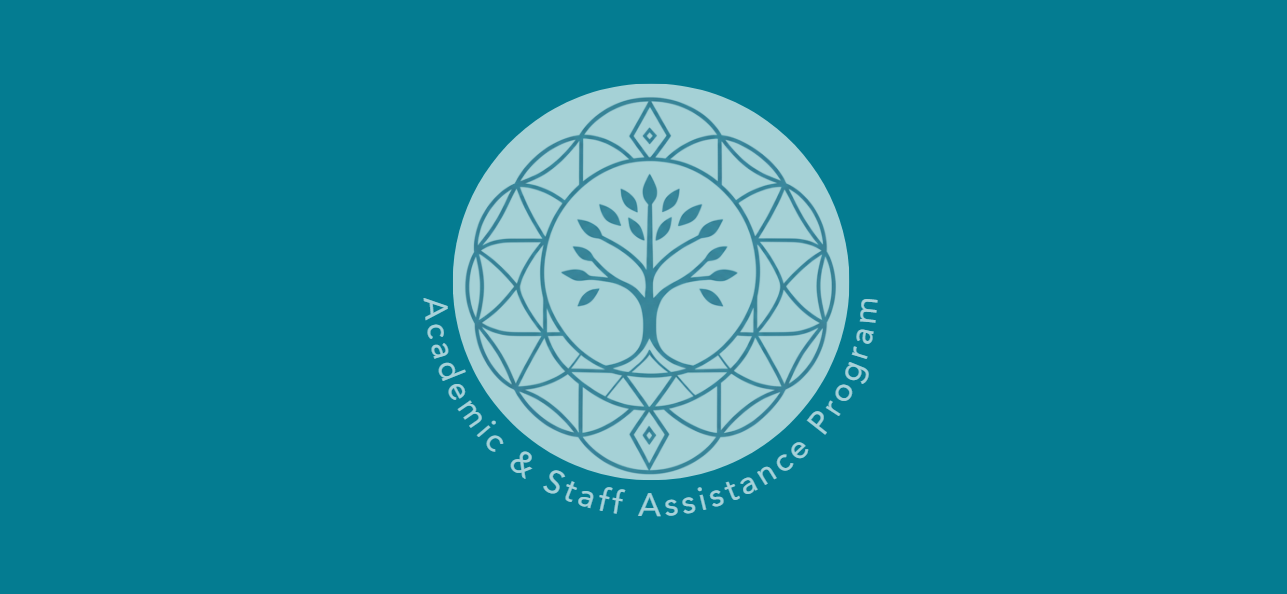Welcome!
The UCSB Academic & Staff Assistance Program (ASAP) supports the health and well-being of faculty, staff, and family members. We assist with identifying, managing, and resolving work-related and personal concerns that may affect job performance and relationships. We offer confidential short-term therapy, consultation, wellness workshops, and assistance with threat management.

In crisis or feeling suicidal?
Help is available
Free 24/7 National Lifeline
Free 24/7 Santa Barbara-area services
- CARES/ ACCESS
888-868-1649 - SAFTY Youth Mobile Crisis Team/ Hotline
1-888-334-2777
Services We Provide
- Therapy
- Groups
- Consultation
- Psychological Wellness Education
- Workshops & Offerings
Resources
- Nationwide
- Community
- Campus
- Trauma
- Behavior-Specific
- Substance Abuse
- Insurance Specific
- Español
- Referral Grid
- Teletherapy, In Person, Psychiatry, Assessment, Caregiver, Grief, Podcasts
In Crisis?
For life threatening emergencies during the day or after hours, academic personnel, faculty, and staff members should call 911 and/or have a family member or friend take the individual to a local emergency room.
Suicide Prevention Resources
- National Suicide Prevention Lifeline
- Suicide Prevention
- Workplace Suicide Prevention
- American Foundation for Suicide Prevention
- SAMHSA
Contact an ASAP clinician to assist in a crisis situation during business hours and we will make every effort to respond. However, we may not be immediately available so it is important to follow the recommendations above.
Other Crisis Resources
Santa Barbara Cottage Hospital Chemical Dependency Services
- Inpatient Medical Detox, 805-569-8339
- Residential Center, 805-569-7422
- Outpatient Treatment, 805-569-7422
The Trevor Project (LGBTQ)
- (866)-488-7386
- Text 'START' to 678-678
- 1-855-845-7415 (non-crisis call/text line)
Higher Level Treatment
- Mission Harbor (IOP, PHP for teens & adults)
- Cottage Hospital (IOP, Residential, In-Patient)
Expanded 24/7 Mobile Crisis Teams in Santa Barbara County
Santa Barbara County's Behavioral Wellness Department now offers 24/7 Mobile Crisis Response Teams for mental health and substance use emergencies. Available around the clock, these teams provide immediate, community-based support, including de-escalation, stabilization, and naloxone administration when needed.
Their services aim to reduce the need for emergency room visits and hospitalizations, offering swift, on-site assistance and connecting individuals with follow-up care.
For immediate help, call the Crisis Response Services Access Line at 888-868-1649. In emergencies involving weapons or overdoses, dial 9-1-1. The Co-Response teams, combining mental health professionals and law enforcement, are here to support you.
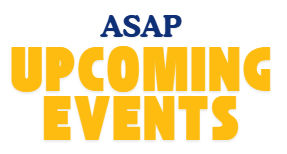 Join us for any of our upcoming events. We would love to have you.
Join us for any of our upcoming events. We would love to have you.
ASAP Drop-in Winter Meditation Group: Tranquil Tuesdays (Online)
Winter Dates: Tuesdays from January 6th-March 17th 12:15pm to 12:35pm
ASAP Confidential Support Group- Leading Others And Caring for Ourselves- Manager's Support Group (Online)
Wednesday, March 4th at 10:30am-11:50am (zoom)
ASAP Wellness Workshop (In Person)- Finding Emotional Balance Through Breath, Sound, and Somatic Awareness/ Econtrando El Equilibrio Emocional a Traves de la Respiracion, el Sonido y la Conciencia Somatica
Thursday, March 5th 12:10pm-12:50pm/ Jueves, 5 de Marzo de 12:10pm-12:50pm
Multi-Purpose Room-Student Resources Building/ Sala Multiusos- Edificio de Recursos para Estudiantes
ASAP Monthly Support Group- Caring for the Caregiver (Online)
Wednesday, March 25th at 12:05pm-12:55pm (zoom)
Services We Provide
Some concerns are hard to leave at home. Some concerns are hard to leave at work.
Therapy
Therapy is available for academic personnel, faculty or staff members with a personal and/or work-related concern, and is provided on a short-term basis. An Intake session is approximately 50 minutes, and may include treatment recommendations, resources, and referrals. ASAP crisis intervention and counseling services are available for employees and their families affected by life's challenges and stessors.
Please call (805) 893-3318 or email asap@hr.ucsb.edu to schedule an appointment. Common concerns we address in counseling are related to drugs and alcohol, anxiety, depression, grief and loss, couples/family problems, stress, anger management, thoughts of self harm/suicide/harm to others, and a wide variety of work-related difficulties.
Free individual therapy and referral assistance in areas including:
- Alcohol and/or Other Drug Misuse
- Anger in the Workplace
- Anger Management
- Anxiety and Stress Management
- Coping with Change and Loss
- Crisis Intervention
- Depression
- Difficult Work Relationships
- Eldercare
- Grief and Loss
- Marriage and Relationship Issues
- Personal Problems
- Substance Abuse in the Workplace
- Violence & Trauma in the Workplace
- Work Related Problems
Consultation
Consultation is typically with a manager, supervisor, dean or faculty member about a work-related concern such as a specific employee or department-level matter. Consultations can be provided on the phone and/or in person.
Psychological Wellness Education
Psychological wellness education is designed to promote workplace well-being for work groups, teams, and departments. Workshops and ASAP facilitated meetings can include development of both skills and processes.
ASAP's YouTube Channel ASAP's Campus Calendar
Violence Prevention
Violence prevention and mitigation services include coordinating resources and assisting individuals, supervisors, and administrators with responses that reduce risk, prevent violence, resolve conflict, and reduce the occurrence of disruptive conduct.
Please Contact Us
Meet our dedicated team
Make an appointment
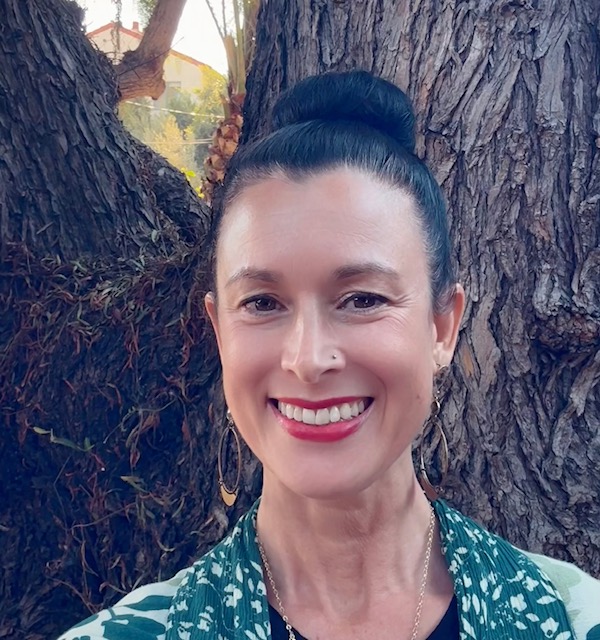
805.893.4358
Pronouns: she/her/hers/ella
Dr. Melissa Cordero is a bilingual, Spanish-speaking clinical psychologist, Somatic Experiencing practitioner, certified yoga teacher, and sound meditation practitioner. As a bicultural Latina therapist and daughter of immigrants, she is committed to providing culturally sensitive consultation, treatment, and workshops for faculty and staff.
Dr. Cordero is originally from Los Angeles and received her doctoral degree in clinical psychology from Pepperdine University. She completed her postdoctoral fellowship at Harbor UCLA, specializing in trauma and working with underserved populations. She has been a psychologist on campus since 2015 and was initially hired under the Department of Education grant to restore the campus climate after the Isla Vista tragedy.
Dr. Cordero specializes in working with underrepresented individuals impacted by racism, discrimination, interpersonal, complex, and collective trauma, as well as multicultural, spirituality, LGBTQ+, and other diversity issues that may present themselves in the workplace. Her current work focuses on applying culturally inclusive and holistic treatment approaches to various challenges that can impact staff and faculty. She looks forward to serving our campus community.
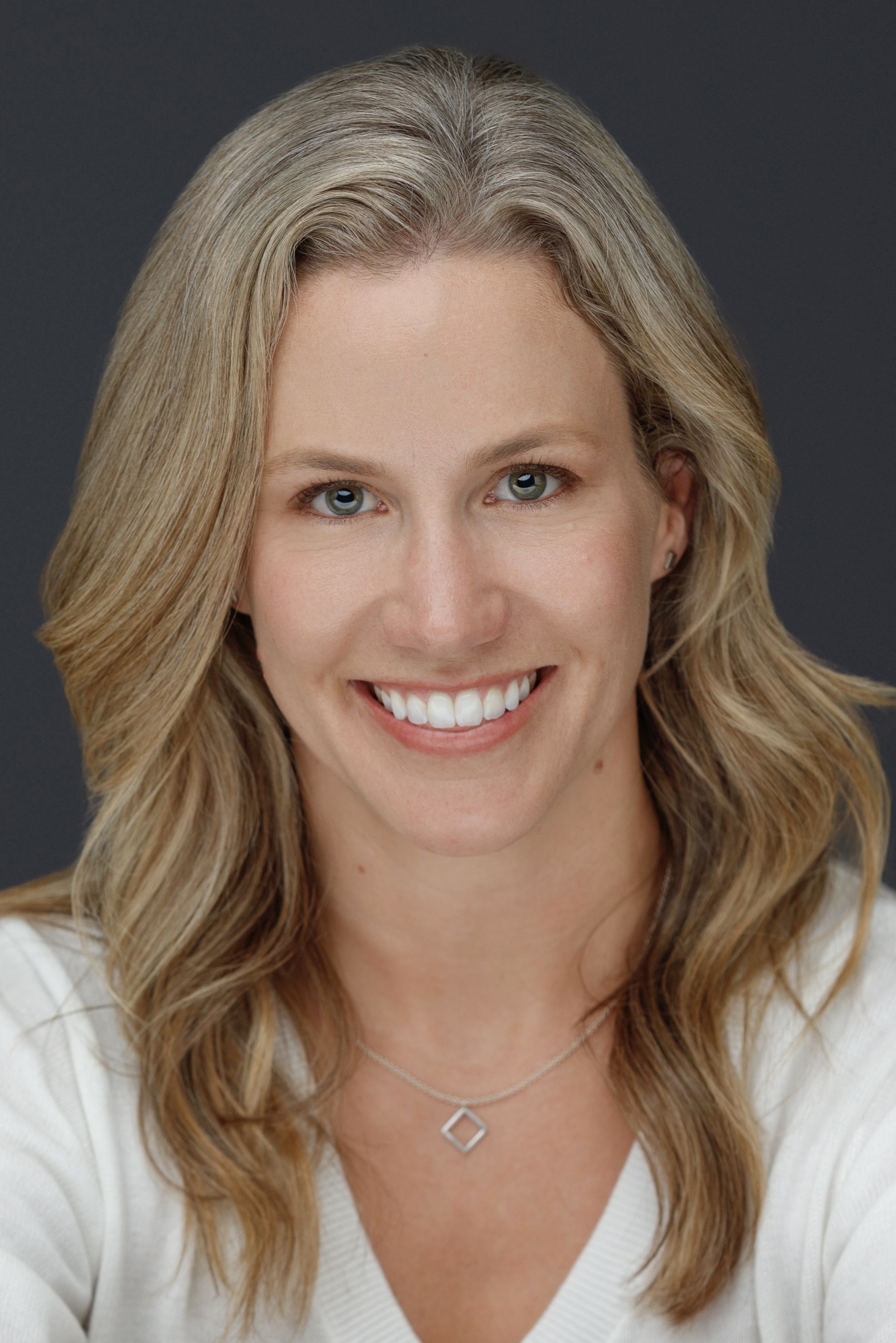
805.893.4477
Pronouns: she/her/hers
Dr. Kate Hawley is a counseling and clinical psychologist with expertise in utilizing culturally sensitive, strengths-based organizational approaches to help employees thrive. She believes that collective well-being is only possible when culture, strengths, context, and individual differences are acknowledged and celebrated.
Dr. Hawley received her PhD in Counseling, Clinical, and School Psychology from UC Santa Barbara and also attended UCSB as an undergraduate student. She completed her clinical residency with an emphasis on multiculturally responsive treatment at the University of Hawaiʻi at Mānoa. She then pursued her postdoctoral training in systemic and organizational approaches to psychological health and well-being at the University of California, San Francisco.
Dr. Hawley’s specialties include diversity-related concerns, neurodiversity at work, self-worth and perfectionism, life transitions, relationship concerns, grief, stress/overwhelm, and communication/emotion-regulation concerns. Dr. Hawley conducts clinical and organizational work through a strengths-based, multiculturally responsive lens, and draws on evidence-based practices to tailor interventions to each individual or team’s goals and needs. She cares deeply about the UCSB community and is committed to improving individual and collective well-being across campus.
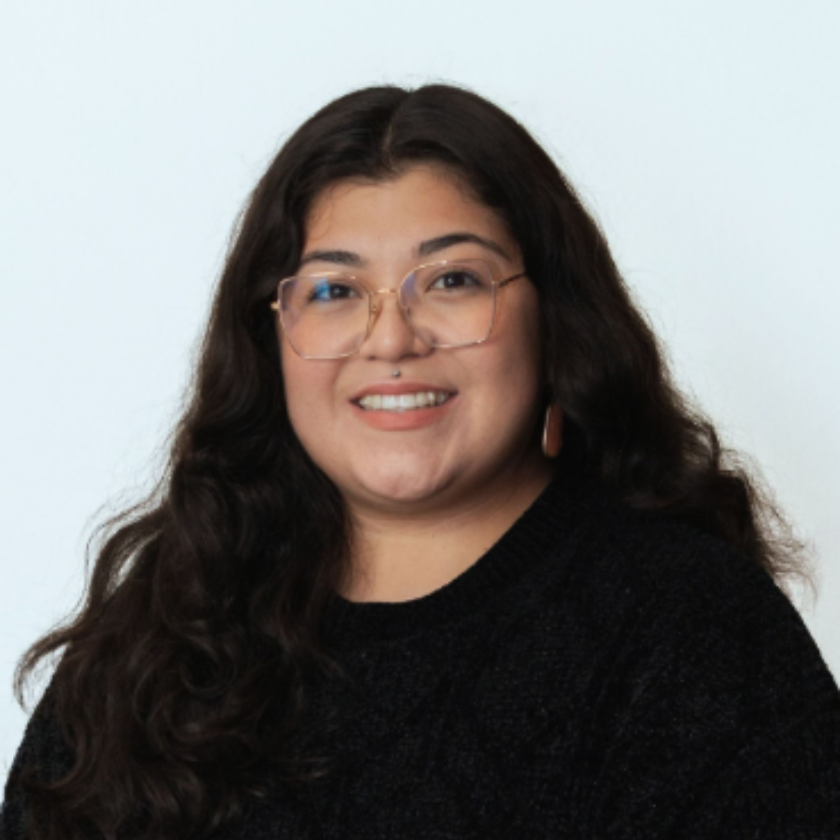
805.893.8737
Pronouns: she/her/ella/they
Valeria is a bilingual, Spanish-speaking Licensed Professional Clinical Counselor (LPCC) and Certified Employee Assistance Professional (CEAP) who utilizes culturally responsive, strengths-based, and trauma-informed approaches to support employee well-being. She believes that psychological safety and collective wellness are strengthened when bicultural identity, life context, and individual strengths are recognized and supported within the workplace.
Valeria joins the ASAP team after completing two years as a Postgraduate Employee Assistance Counselor with the UC San Diego Faculty and Staff Assistance Program, where she developed a strong understanding of internal Employee Assistance Programs within a higher education context. During this time, she created the First-Generation Professionals Support Group, fostering connection and psychological safety for an often-overlooked employee population. Valeria earned her Bachelor of Science in Developmental Psychology from the University of California, San Diego, and her Master of Science in Counseling with an emphasis in Multicultural Community Counseling and Social Justice Education from San Diego State University. As a first-generation Salvadorian American mujer raised in East Los Angeles, she brings a personal understanding of the systemic barriers faced by underrepresented communities. Her areas of emphasis include first-generation professionals, biculturalism, work-life balance, communication skills, life transitions, relationship concerns, trauma-informed care, and organizational support. She is committed to supporting employees in navigating personal and professional challenges while advancing institutional well-being.
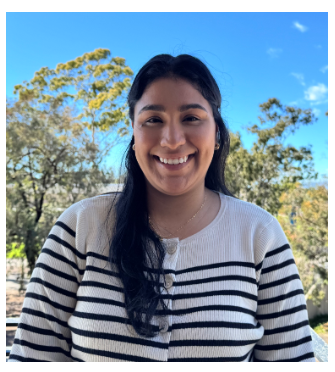
805.893.2854
Pronouns: she/her
Maggie earned her Bachelor's degree in Communications from UC Santa Barbara and holds a Paralegal Certificate. To further enhance her skills, she is currently pursuing her HR Management certification.
ASAP is located in the Human Resources office on the 3rd floor of the Student Affairs and Administrative Services Building (SAASB). We are in the same building as the campus Visitor's Center.
Monday - Friday, 8:00 a.m. - 4:00 p.m.
Phone: 805.893.3318
Email: asap@hr.ucsb.edu
Submit an
HR ServiceNow Ticket
At times you may receive the voicemail, we will return your call as soon as possible.
In emergency situations, call 911 or go to your nearest emergency room.
Resources
Octave: Our Behavioral Health Partner
Octave - Dedicated to UC Santa Barbara Employees
- Octave is in-network for all Anthem and Health Net/MHN commercial lives across the state of CA, and all Aetna commercial lives in New York
- Octave offers consistent and high-quality mental health care provided by qualified providers who practice evidence-based therapy, and measurement-based care
- Octave delivers superior client and therapist experience by focusing on the client-therapist relationship and the strength of the therapeutic alliance
- Services offered include: Individual therapy, Couples/Relationship Therapy, Coaching
- Please note that Octave does not currently provide services for: clients under 18, psychiatric medications and prescriptions, specific care for serious eating disorders or substance use
Accolade: For PPO Plans
.png)
- Get 12 no-cost mental health therapy (age 18 and older) visits each calendar year (January 1–December 31) for each family member*
- Mental health and online therapy (stress, anxiety, depression, grief and loss, trauma, etc.)
- Doctor and therapist profiles that include experience, reviews, language and more
- Clinical support from nurses is available 24/7
- 2nd MD is Accolade’s expert medical opinion service. Get a second opinion from a leading specialist at no cost so that you feel confident about a new diagnosis, and treatment plan or medication
*Beginning with visit 13, your cost for each mental health visit is $115
Anxiety & Panic Disorders Clinic of Santa Barbara
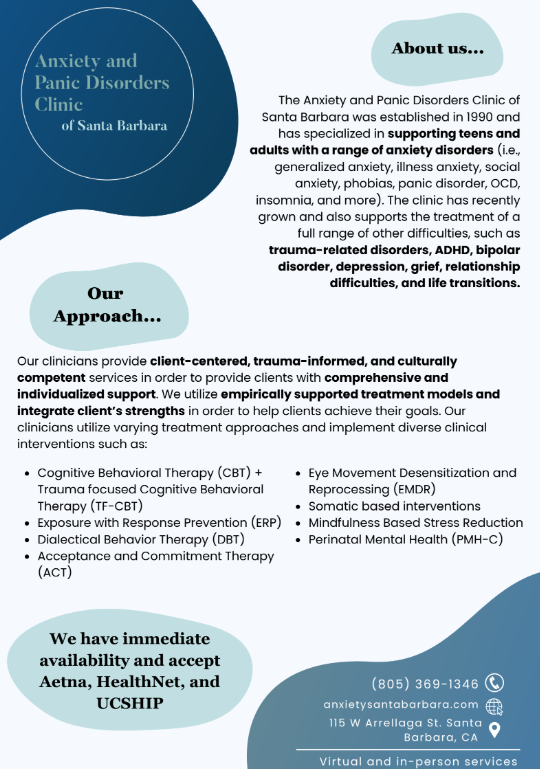
Anxiety & Panic Disorders Clinic of Santa Barbara
- Specializes in Cognitive Behavioral Treatment (CBT) for individuals with any type of anxiety disorder
- Personalized therapy for anxiety, panic, stress and related mental health issues
- Evidence-base treatment focusing on managing symptoms and improving mental wellness
- Convenient online scheduling for therapy appointments
ALMA Clinic

- Focus: Culturally-responsive care focused on Latinx individuals, couples, and families (services in English and Spanish) for a wide-range of presenting problems.
- Cost: Low cost to free depending on financial need.
- Availability: Several immediate openings available.
- Interested clients can reach out by email or by phone to 805-893-8064.
UC Davis Menopause Program

Menopause Support in the Workplace-Free to all UC Employees
- Monthly Menopause Interest Group: Meno-Power is a free online group open to all UC staff and faculty.
- For individuals who are experiencing symptoms of perimenopause and menopause, or who are curious about this normal but challenging life process. Please join the conversation and share about how this affects you and your well-being.
- Held on the first Wednesday of each month from 12:00 - 1:00 pm.
- Embracing the Change: Menopause – Free 3-part expert-led webinar series on symptoms, health, and lifestyle.
I AM WELL
I AM WELL Institute is a nonprofit collective dedicated to:
- Free monthly wellness support groups
- Expanding access to no-cost mental health and wellness support
- Providing trauma informed, compassionate care to individuals and communities
- Utilizing evidence-based approaches to expand access to care across California
Nationwide Resources
Community Resources
Campus Resources
Trauma Resources
- Stress and Coping - CDC
- Coping with a Traumatic Event - ASAP
- Center for Disease Control and Prevention – Mental Health
- Building your resilience – APA
- Tips for managing your distress related to wildfires - APA
- Managing Your Distress in the Aftermath of a Mass Shooting - APA
- Grief: Coping with the loss of your loved one - APA
Behavior-Specific Resources
Substance Abuse Resources
Insurance Specific Resources
Referrals
In-Person Clinics
Insurance-Friendly Assessment
Grief Support
